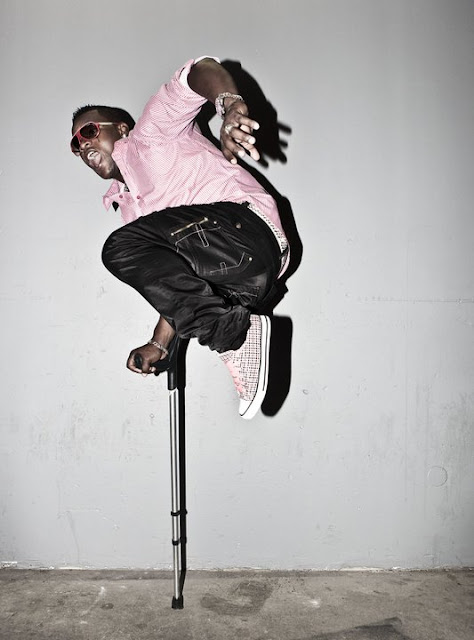'Costuleta, in the music videos that made him famous, begins by gyrating on crutches (he lost his leg as a child) while rapping, surrounded by beautiful dancing women and palm trees. Suddenly, unexpectedly, he explodes into improbable acrobatics: dancing, jumping, and flipping. To view this for the first time is surreal. But for the most iconic figure in the exciting Angolan kuduro scene, defying people’s expectation has been way of life.
Costuleta’s 2005 hit “Tchiriri,” the infectious anthem which exemplifies the genre’s mix of booty-shaking African house, hip-hop, and soca, pushed the local kuduro style (and him) to the world stage. Born into a poor family in Luanda, Angola, he now regularly plays to thousands in the French-Caribbean, Brazil, Africa and Europe.
Recently signed to Sony France, Costuleta agreed to an interview in a Paris hotel. Priest-like in a tight, white hooded shirt, loose white pants and a sandal, he made his way across the hotel lobby on crutches, settled into the sofa chair, and fielded questions from behind dark, square sunglasses for this, his first interview to an English-speaking audience. The man’s energy and charisma were palpable, and his easy, infectious smile simultaneously reinforced his humor and softened the edges of what turned out to be a very candid interview."
"I am from Luanda, the capital of Angola. My mother was a housewife, a regular woman. My family was far from rich. When I was 4 years old, I was in a car accident, and lost my leg. My father died shortly thereafter. When I was 12, the wife of the President of Angola gave a present to the disabled children of the country, and sent many of them overseas for treatment and prosthetic fitting. I went to Germany. I was there for a while.
Sometimes when I had a chance, I tried to go out and break dance and rap. But it was very racist there. It was hard for me to move around. Eventually I moved back to Angola. I started dancing with Tony Amadou, one of the first kuduro artists. By that time I had been adopted away from my mother’s home by a white Italian family in Luanda, who thought I was cute as a handicapped dancer."
SEE FULL INTERVIEW ON MTVIGGY.COM.
Costuleta & Writer Rishi Bonneville.



No comments:
Post a Comment